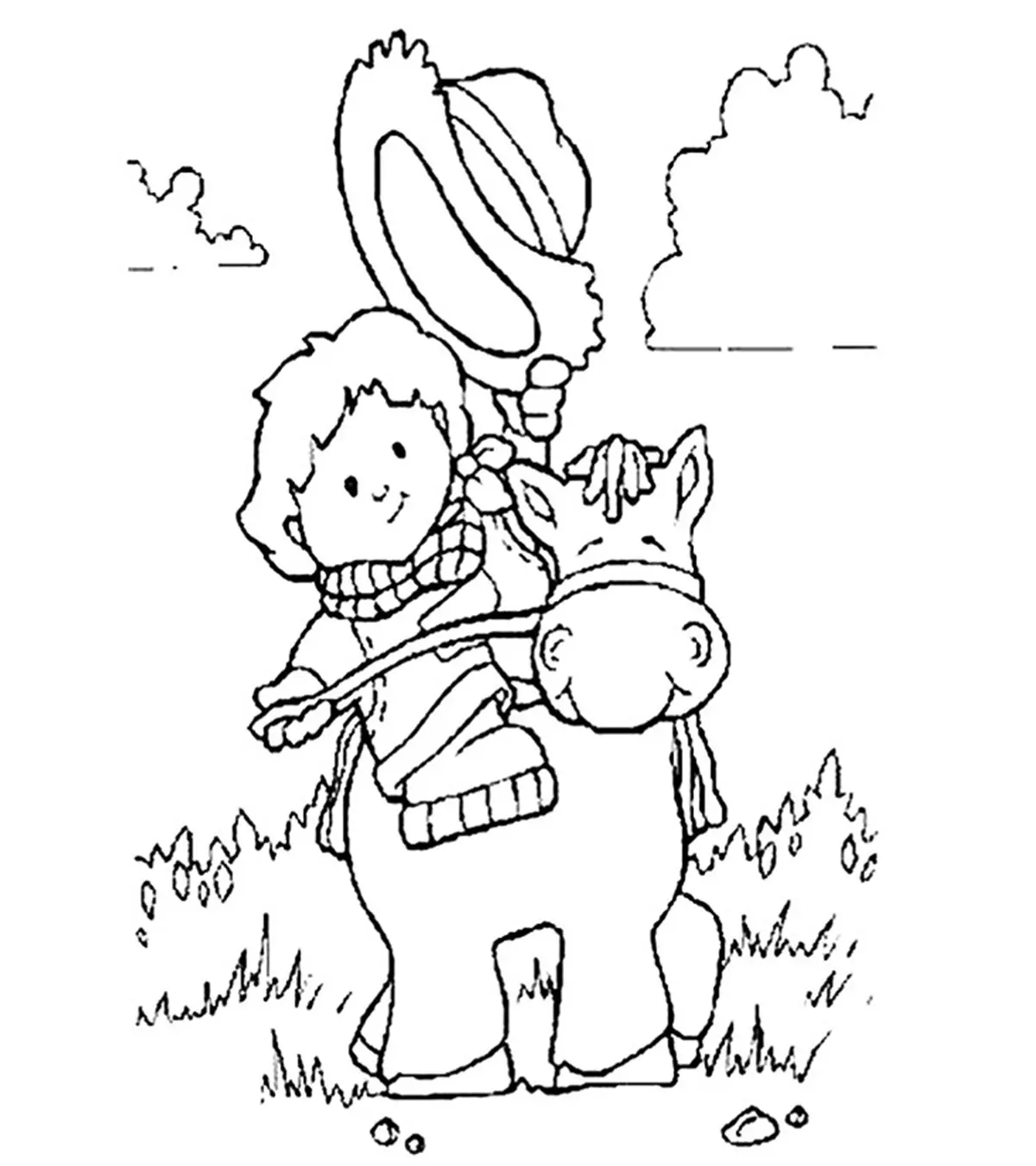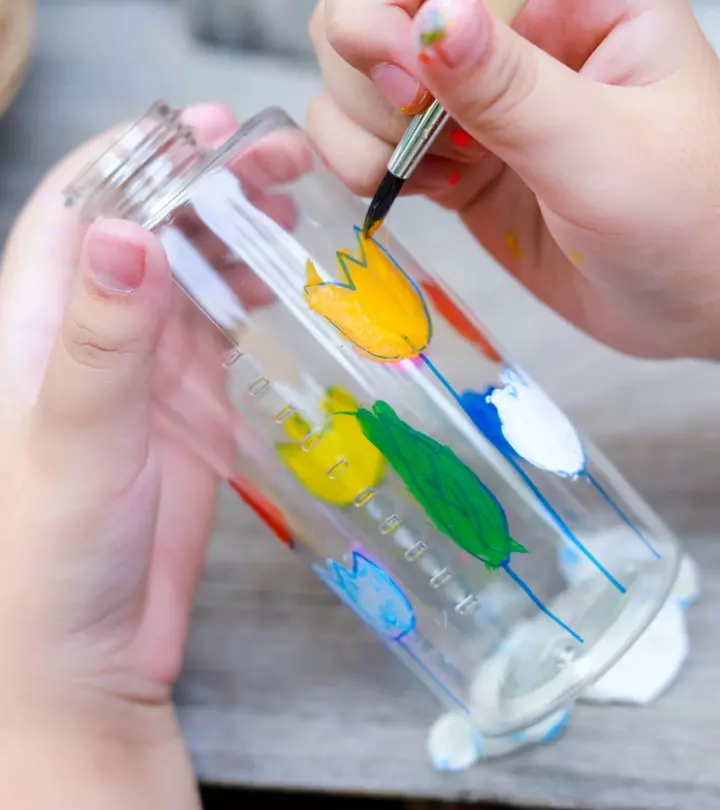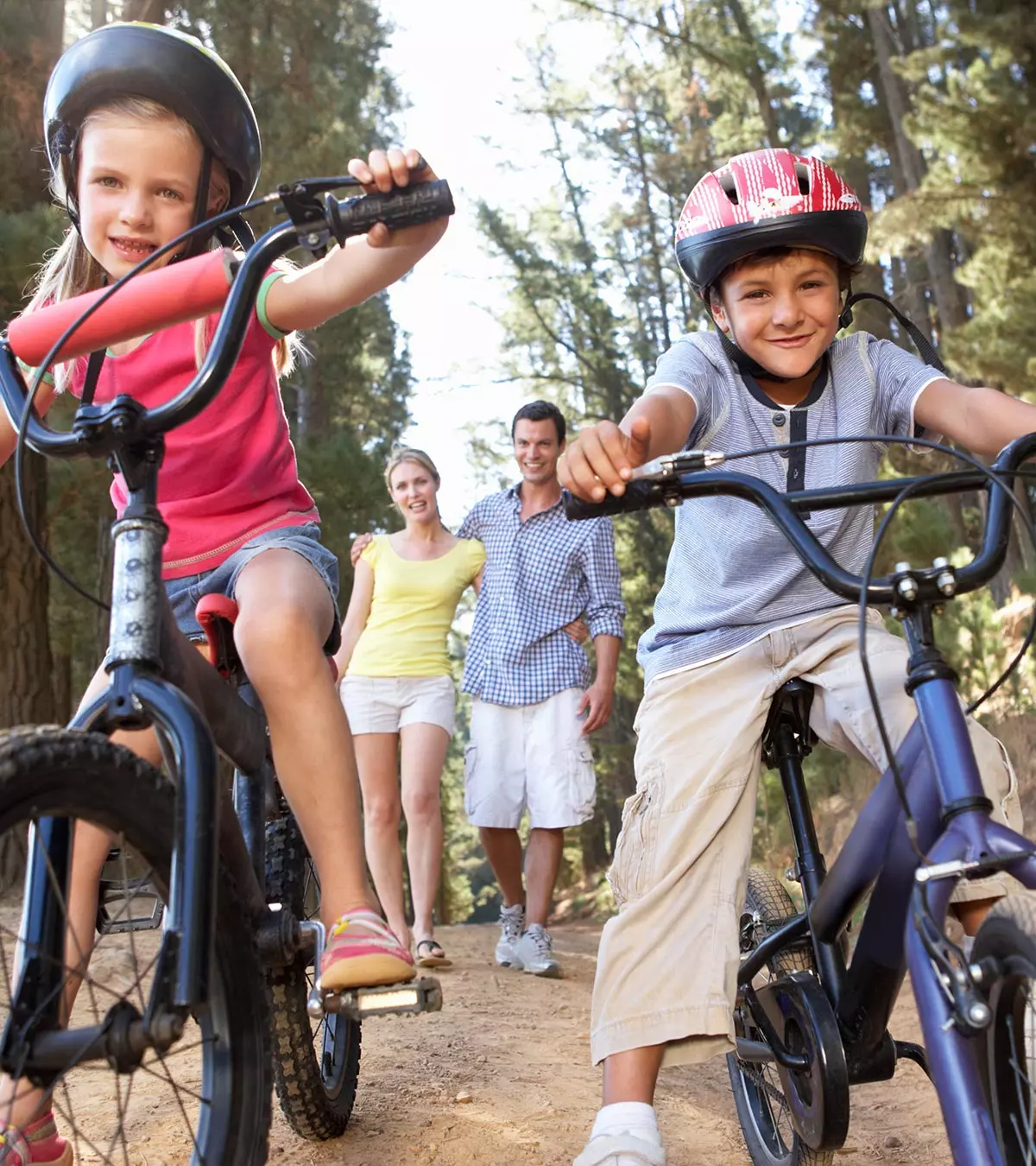
Image: Shutterstock

For a child’s overall development, a balance of everything is required, which includes their outdoor playtime. The benefits of outdoor play for kids may include improved health and mental well-being, social skills development, learning teamwork, and becoming independent. Continue reading this post as we explain the importance and advantages of outdoor play in your kids. Thus, ensuring that your child receives some outside playtime in the midst of their busy schedule of school, homework, and screen time. Continue reading as we explain the importance of outdoor games for children.
Key Pointers
- Playing outside is good for mental and physical health as it improves mood, strength, and flexibility.
- Children are challenged when they play in groups, improving their social skills.
- Restrict outdoor play in unclean places and during unsuitable climates, as it may cause health issues.
- Invest in playground equipment for the garden or in items such as jump rope, hula hoops, and others to encourage outdoor play.
Importance Of Outdoor Play For Kids
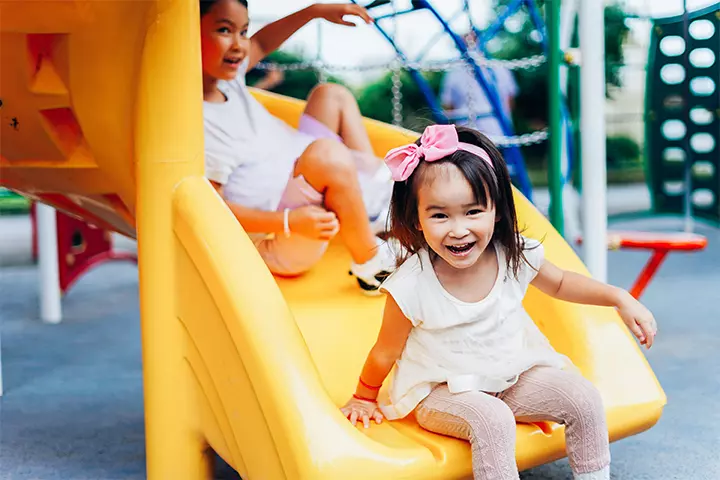
Image: IStock
Outdoor play encourages young children to exercise their bodies and minds. It engages all the senses and keeps them physically and mentally healthy.
Here are a few reasons why you should encourage outdoor play in children.
- Enables them to do moderate-intensity exercises
- Cuts down sedentary time and a plethora of health problems associated with it
- Improves cognitive performance
- Elevates their mood
- Helps develop fine and gross motor skills
- Encourages exploration and creativity
A writer, Julie Janis, reflects on her involvement in a preschool program during her college years, highlighting the advantages of outdoor exposure for children. She shares, “As a college student, I had the opportunity of being a teacher at a Forest Preschool program. It was a wonderful and eye opening experience to see the benefits that nature had to offer to young children. After this experience, I got put into the indoor preschool and I noticed many differences between the outdoor children’s temperaments, social skills, and cognitive skills to the indoor children. The outdoor children examined better behaviors, socialized more and used far more problem solving than indoor children. I was able to pinpoint many children in the Forest Preschool who I knew would thrive academically and later in life all because they spent their childhood outside (i).”
A 2019 survey in the US of four generations—Boomers, Gen X, Millennials, and Gen Z—found that Gen Z had the most significant participation rate (59.1%) in outdoor activities. Conversely, the Boomers were the least engaged in outdoor activities, as shown in the graph below. Ultimately, outdoor activities help young children grow up to be balanced, healthy, and resilient individuals. They also improve family bonding—spending time in nature together helps create lasting memories and strengthens ties.

Involvement in outdoor activities among the US population
Source: Participation rate in outdoor activities 2019, by age group; Statista Research DepartmentUltimately, outdoor activities and extracurricular activities for kids help young children grow up to be balanced, healthy, and resilient individuals.
Benefits Of Outdoor Play
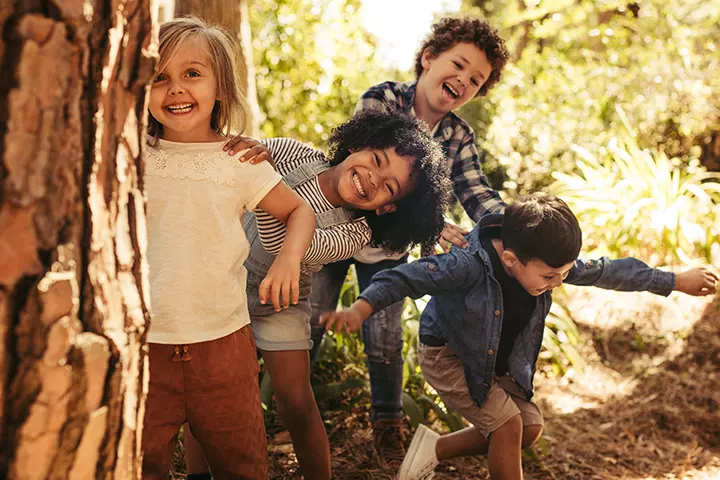
Image: IStock
The following are some of the potential benefits of outdoor play for children.
1. Encourages continuous learning
Outdoor games can be a brilliant way to enhance young children’s learning abilities. An outdoor environment provides a learning space where children can learn new things. From improving communication and social skills to developing problem-solving abilities and acquiring new information regularly, playing in groups can help children learn essential life lessons and skills that can’t be attained through classroom learning or books alone. Outdoor play also helps young children feel that learning is a continuous process rather than just something carried out in a classroom (1).
2. Improves health
Physical development is as essential as mental development. Outdoor games are an excellent form of exercise for children. When young children indulge in outdoor games, their physical activity increases, and their energy and stamina get a boost throughout the day. Furthermore, these games will provide stress relief, help improve a child’s mood, and boost their fitness and immunity levels. Outdoor play helps develop strength, bone density and large muscle groups. Plus, a few hours of sunlight can help your child get the recommended amount of much-needed vitamin D (2) (3).
 Quick fact
Quick fact3. Hones social skills
During the outdoor time, children learn socialization skills and are exposed to new environments, thus challenging them to improve. For instance, when children take turns on the swing, it can help them learn how to work together in a group or play safely. They also learn how to look out for each other and treat others with care and respect. Furthermore, when young children meet new children at a local park or in a play area, they get the chance to explore new experiences and make new friends.
Compared to those who are glued to the screen and spend time indoors, young children who often play outdoors interact effectively. They’re forced to get out of their shells, make new friends, or approach different children, thereby improving their social and communication skills (3).
4. Encourages a love of nature
Nature is integral to the survival of all living beings. When young children spend time outdoors, they are in close contact with nature. The longer they spend with Mother Nature, the more they develop an attachment, love, and fondness of it.
The present scenario is harsh. Nature is depleting at an alarming rate. Taking this into consideration, inculcating a love of nature in children from a young age is crucial. You could also take them out on nature trips and teach them about the effects of global warming and deforestation (3).
5. Strengthens muscles
Besides aiding in cognitive development, outdoor play is equally important for the development of the body. When young children spend time running around in the local park or climbing things, they’re challenging their bodies, which helps strengthen muscles. Also, outdoor activities help children in learning risk-taking, enabling them to push their limits and acquire new skills while enhancing self-confidence (4).
6. Awakens curiosity and develops creativity
Even the minutest of things amazes young children, and they can instantly draw inspiration from the smallest of things. Whether it’s playing with sand in the play area with adult supervision or running around with friends on the school grounds, outdoor time promotes creativity. The open spaces and lack of constraints ensure greater freedom and stir up a child’s imagination. This is primarily because a child is far more inquisitive of their local environment and current surroundings. Not only do they notice things quicker, but also swiftly learn as their minds are receptive to loads of information (5).
 Experts say
Experts say7. Improves attention span
One of the top benefits of playing outdoors and spending time in nature is improved attention, especially for young children affected with Attention Deficit Hyperactivity Disorder (ADHD). Playing outdoors is also known to improve performance at school. Unlike in a classroom, outdoor time is considered as recreation. Young children put a lot of effort into winning outdoor sports, which takes immense concentration and coordination. Thus, along with physical benefits, outdoor play comes with mental benefits (5) (6).
8. Develops motor skills
Outdoor play offers children an assortment of objects to play with, which helps them build and improve their fine and gross motor skills.
Whether it’s climbing up a tree or building a sandcastle in the play area, every activity is different and develops their motor skills in one way or another.
In the first few years of their life, it’s important to work on these skills and build them. Hence, it is of paramount importance to engage with objects to develop these skills (4) (7).
9. Increases levels of happiness
Call it science or a fact, but it’s proven that the outdoors makes a person happy. The natural beauty, the warm sunshine, and the fresh air stimulate the happy hormones within the brain, resulting in mood elevation.
Outdoor play is an excellent outlet for children to positively release any built-up frustrations or energy. It also ensures they’re in a happier mood throughout the day and helps them sleep soundly at night (3) (8).
 Quick fact
Quick fact10. Gives children new perspectives
Seeing things from different perspectives is extremely crucial. You can boost this in your child with outdoor play.
Young children who always remain indoors have no interest in what’s going on outside their four walls. It’s a whole new world out there, and once a child steps out of the comfort of their home, there’s no going back.
Suddenly, in this new world, they’re able to observe and develop opinions, face and handle problems, and arrive at ideal solutions to problems (9).
11. Improves emotional intelligence
Outdoor play provides children with opportunities to navigate their emotions, understand others’ feelings, and develop empathy. It also allows children to face challenges, experience failure, and deal with stress and anxiety in a healthy way, which are crucial for emotional growth.
Although these are just a few of the major benefits of outdoor play for young children, once you let your child loose, you’ll learn many more.
Are There Any Disadvantages Of Children Playing Outdoors?

Image: IStock
Doing everything in moderation is key, and this includes outdoor play as well. While the disadvantages aren’t significant, it’s best to have a balance of all activities.
Here are a few disadvantages of outdoor play for kids:
- Out of their love for outdoor play, at times, young children may overexert themselves. This can cause health problems, such as physical strain.
- An overindulgence of outdoor recreation can cause a child to neglect studies or other aspects of life. As mentioned earlier, it’s important to strike a perfect balance between all activities, including studies and outdoor play.
- On hot afternoons, leaving the skin unprotected without sunscreen can lead to skin problems in the long run. Similarly, in winter, every child needs appropriate clothes to keep themselves warm. Every season comes with its safety concerns that you need to consider.
- The outdoor play area needs regular maintenance. From discarding the trash to moving any tools, pieces of equipment, or sharp branches away, you need to keep the area safe for your child.
- When you go hiking or camping in the woods, it’s important to keep a bottle of bug spray handy. This can keep your child safe from infections and bug bites.
- Children may come in contact with strangers when outdoors. So, you need to talk to your child about strangers.
- Hydration is important. Ensure they have a constant supply of water to rehydrate during and after play.
Tips To Encourage Kids To Play Outside

Image: IStock
1. Invite friends to play
You can visit them, invite them over, or meet them at the local park. From hop, skip, and jump to dodge ball, encourage your child to play games together. Take it one step further by planning a sports tournament for all the children.
2. Turn your yard into a playground
An easy way to get your kiddos outside is to transform your yard into a playground. With just a handful of elements and creative ideas, such as hanging a tire swing, pitching a tent, or filling a garden bed with sand, you can give your child an instant play area to explore.
3. Do indoor activities outside
Make regular mundane activities more fun by taking them outdoors. While you laze around on the back-porch swing, your child can play with their dough or beading kits. Alternatively, you can lay a blanket on the grass and read books together. This could allow you to get your outdoor time, soak in some vitamin D, and spend time together!
 Did you know?
Did you know?4. Plan nature experiences
From hiking to trekking and walking on the beach to strolling around your neighborhood, get some outdoor time, and discover all that the green space has to offer. You can also plan a scavenger hunt to encourage your child to explore the local environment, searching for specific plants, flowers, animals, and other items. Just ensure you plan slow-paced activities so that your child can keep up and enjoy the current surroundings.
5. Try a new outdoor sport
When young children are over soccer and haven’t touched a ball in years, you can introduce them to a new sport like baseball, basketball, or tennis. Ensure you pick kid-friendly sports.
6. Use fun equipment
Utilize items such as jump ropes, frisbees, balls, and hula hoops that encourage outdoor play.
Frequently Asked Questions
1. What are outdoor adventure activities for kids?
Examples of outdoor adventure activities for kids are obstacle courses, hiking, scavenger hunt, nature walk, bike riding, gardening, and water-based activities.
2. What are the three categories of outdoor activities for kids?
Outdoor games and activities for kids may be categorized into necessary, optional, and social activities (10).
3. How can outdoor play help kids learn about the environment?
Outdoor games for toddlers and kids enable children to explore and observe the natural world around them. Watching different plants, insects, birds, and other wildlife stirs their curiosity about the environment. Sensory experiences, such as feeling the soil, experiencing sunlight’s warmth, and enjoying the coolness of the morning breeze, further strengthen their connection with nature. Furthermore, outdoor play exposes children to the interconnectedness of ecosystems, which helps instill a sense of environmental responsibility.
4. How can educators incorporate outdoor play into their classroom?
Educators can incorporate outdoor play into their classrooms by implementing various strategies. For instance, schools can create outdoor learning spaces to use nature to teach different subjects. They can organize nature walks and field trips to let children experience the natural world around them. Additionally, they can establish a school garden where students can participate in activities like planting, nurturing, and harvesting plants, which will help deepen their understanding of the natural environment. Furthermore, schools can conduct experiments on various topics and encourage students to engage in art projects inspired by the natural environment.
5. How can parents create safe outdoor play spaces for kids?
Assess the outdoor play spaces for any potential hazards that could pose a risk of injury, such as unstable structures. Install age-appropriate play equipment with protective surfaces. Ensure they meet safety standards and are properly maintained. Set boundaries and keep children under your supervision. Encourage them to use sunscreen frequently to prevent sunburns and provide them with enough water to prevent dehydration. Most importantly, indulge in open communication with your neighbors, asking them to keep a watch on your child. It will help ensure the overall safety of outdoor play.
Although there are many ways in which children can keep themselves entertained, nothing can match outdoor play. As a parent, it is important to understand the benefits of outdoor play for kids and not to label it as a mere act of fun and amusement. Children who indulge in regular outdoor play enjoy better health, develop better social skills, and grow their love for nature. Therefore, even if your children are not keen on playing outdoors, you should encourage them to try out new sports for kids, plan new nature activities, or invite their friends. Inactivity can have adverse effects on life in the future, so make sure your children enjoy their childhood running, jumping, and rolling in the outdoor environment.
Infographic: Outdoor Play Safety Guidelines
Outdoor play is beneficial for children in many ways. However, it could also be unsafe sometimes. Prepare your child to face the adversities of the outdoor world through this infographic on safety tips while playing outside for children.
Some thing wrong with infographic shortcode. please verify shortcode syntax
Illustration: Top 10 Benefits Of Outdoor Play For Kids And Tips To Follow

Image: Stable Diffusion/MomJunction Design Team
Discover the amazing benefits of outdoor learning for primary school kids! Learn how outdoor activities can help children develop important skills and foster a love of nature.
Personal Experience: Source
MomJunction articles include first-hand experiences to provide you with better insights through real-life narratives. Here are the sources of personal accounts referenced in this article.
i. Why you should take your children outside;https://medium.com/@juliejanis96/why-you-should-take-your-children-outside-920f93190c7c
References
1. Gabriela Bento and GiselaDias; The importance of outdoor play for young children’s healthy development; Porto Biomedical Journal (2017).
2. Playing outdoors; NI Direct Governmen Services
3. 6 reasons children need to play outside; Harvard Health Publishing
4. 6 Research-Backed Benefits of Outdoor Play for Children; MindChamps
5. Why Kids Need to Spend Time in Nature; Child Mind Institute
6. Outdoor Education – Research Summary; University of Wisconsin – Stevens Point
7. Outdoor play and why it’s important; The Education Hub
8. Top 5 benefits of children playing outside; Sanford Health
9. Why Kids Need to Spend Time in Nature; Child Mind Institute
10. Reza Keshtkaran; (2019); Urban landscape: A review of key concepts and main purposes; ResearchGate.
11. The Importance of Outdoor Play and Its Impact on Brain Development In Children; UMKC School of Education.
12. Benefits of outdoor play: Why it matters; Children’s Hospital of Philadelphia (2025)
13. Spending Time Outdoors Promotes Good Mental Health; Nationwide Children’s
14. What is Kaplan’s Attention Restoration Theory?; Positive Psychology (2018)
Community Experiences
Join the conversation and become a part of our nurturing community! Share your stories, experiences, and insights to connect with fellow parents.
Read full bio of Dr. Maymunah Yusuf Kadiri
Read full bio of Advaitaa Ravi
Read full bio of Harshita Makvana
Read full bio of Nisha Bharatan









